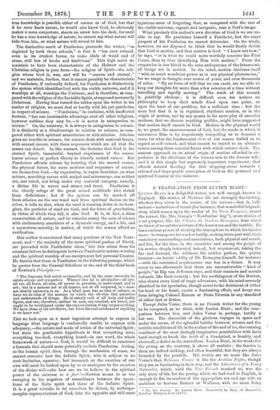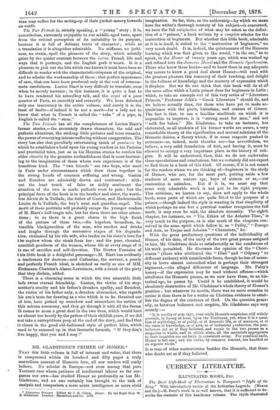The Two Friends. By Lucien Biart. Translated by Mary de
Bautevillo. London: Sampson Low and Co. A TRANSLATION FROM LUCIEN BIART.* LUCIEN BIAIIT is a delightful writer, not well enough known in England. His stories of Mexican life are strangely fascinating, whether they occur in the course of his serious—that is, half- serious—narratives of travel (for instance, that wonderful brigand- story which comes upon the reader of La Terre Teneperje, round the corner, like Mrs. Garup's " Newfunlan' dog"), or are stories of a set purpose, like his Clientes do Docteur &maybes, than which we know of no subtler mixture of the humorous and the terrible. He has a curious power of creating the atmosphere in which his fancies move ; he transports his readers bodily, making them part with their customary surroundings and associations, both physical and moral, and live, for the time, in the countries and among the people of his stories, deeply interested indeed, but acquiescent, taking the fire and fervour, the wildness, the sudden pathos, the quaint humour—an heroic oddity of Dr. Bernagius himself, for instance —with the contented acquiescence one has in a dream. It may occur to one afterwards that these are uncomfortable "kind of people," as Rip van Jefferson says, and their manners and morals volcanic, like their country ; but the soothingness of the Doctor, who shares every kind of tragic adventure, with his mind serenely absorbed in his specimens, though never to the detriment of either his head or his heart, exerts a fascinating effect, and keeps one from bringing Colonel Ramon or Dofia Evornia to any standard of either fact or fiction.
Except Jules Verne, there is no French writer for the young to be compared, as we think, with Lucien Biart ; and the com- parison between him and Jules Verne is, perhaps, hardly a fair one. The chronicler of the glorious voyages in space and under the ocean, of the splendid battles between science and the terrible conditions of life in the realms of fire and of ice, the cunning combiner of the most daringly imaginative possibilities with facts bard enough to break the teeth of a Gradgrind, is frankly, and above all, a dealer in the marvellous. Lucien Biart, in his works for the young, on the contrary, is above all realistic ; the fancies in them are indeed striking, and often beautiful, but they are always bounded by the possible. His stories are no more like Jules Verne's than Robinson Crusoe is like the Arabian Nights, though they are as fascinating in their way, and the Adventures of a Young Naturalist, which, until the Two Friends reached us, was the • only story of his, for the young, which we had read in English, is enough to fire its readers of the appropriate sex and age with an ambition to become Bateses or Wallaces, with no more delay
than may suffice for the saving-up of their pocket-money towards an outfit.
The Two Friends is, strictly speaking, a " young " story ; it is, nevertheless, extremely enjoyable to our middle-aged taste, apart from the critical perception of its suitability to its purpose, because it is full of delicate traits of character ; while as a translation it is altogether admirable. No stiffness, no jerki- ness, no strain, spoil the pleasure of the story, which actually gains by the quaint contrast between the intime French life and ways that it portrays, and the English garb it wears. It is a pleasure to pick out the bits which one knows it must have been so difficult to render with the characteristic crispness of the original, and to admire the workmanship of them ; that perfect appearance of ease, that can have been produced only at the cost of consum- mate carefulness. Lucien Biart is very difficult to translate, even when he merely narrates ; in this instance, it is quite a feat to to have rendered his schoolboy talk, and the argot of a poor quarter of Paris, so smoothly and correctly. We have detected only one inaccuracy in the entire volume, and surely it is the least of faults—if indeed it be not a merit—for a lady not to know that what in French is called the " tube " of a pipe, in English is called the "stem."
The Two Friends has all the completeness of Lucien Biart's former stories,—the accurately drawn characters, the odd and pathetic situations, the striking little pictures and terse remarks, the power of conveying intense suffering without exaggeration. The story has also that peculiarly entertaining touch of gaminerie by which he establishes a hold upon his young readers in his Parisian and provincial tales, just as in his Mexican stories he catches his older clientele by the genuine outlandishness that is most fascinat- ing to the imagination of those whose own experience is of the humdrum kind. The "two friends" are two boys, who meet in Paris under circumstances which draw them together in the strong bonds of common suffering and wrong. Gaston and Bouchut are admirably drawn and contrasted ; with- out the least touch of false or sickly sentiment the situation of the two is made pathetic even to pain ; but the principal force of the book is in the brother and sister, the worth- less Alexis de la Taillade, the father of Gaston, and Mademoiselle Louise de la Taillade, the boy's aunt and guardian angel. The merit of these portraits will probably escape the younger readers of M. Biart's half-tragic tale, but for them there are other attrac- tions; to us there is a great charm in the high finish of the picture of these two,—the hopeless, boundless, in- vincible blackguardism of the man, who smokes and drinks and laughs through the successive stages of his degrada- tion, victimised by his vile wife, who trades on his sister's love for the nephew whom she steals from her ; and the pure, elevated, unselfish goodness of the woman, whose life at every stage of it is one of sacrifice and self-devotion. The Doctor Fontaine of this little book is a delightful personage—M. Biart has evidently a tenderness for doctors—and Catharine, the servant, a purely and perfectly French ideal, is sketched as racily as one of MM. Erckmann-Chatrian's Alsace-Lorrainers, with a touch of the piety that they disdain, added.
There is a charming scene in which the two miserable little lads swear eternal friendship. Gaston, the victim of his step- mother's cruelty and his father's drunken apathy, and Bouchut, the victim of his father only, a drunken shoemaker, who regards his son's taste for drawing as a vice which is to be thrashed out of him, have picked up somehow and somewhere the notion of this solemn ceremony, and they go through it with all the forms. It comes to mean a great deal in the two lives, which would hurt us almost too keenly by the pathos of their childish years, if we did not take a surreptitious peep at the end of the story, and find that it closes in the good old-fashioned style of perfect bliss, which used to be summed up in that favourite formula, "If they don't live happy, that you and I may !"



































 Previous page
Previous page